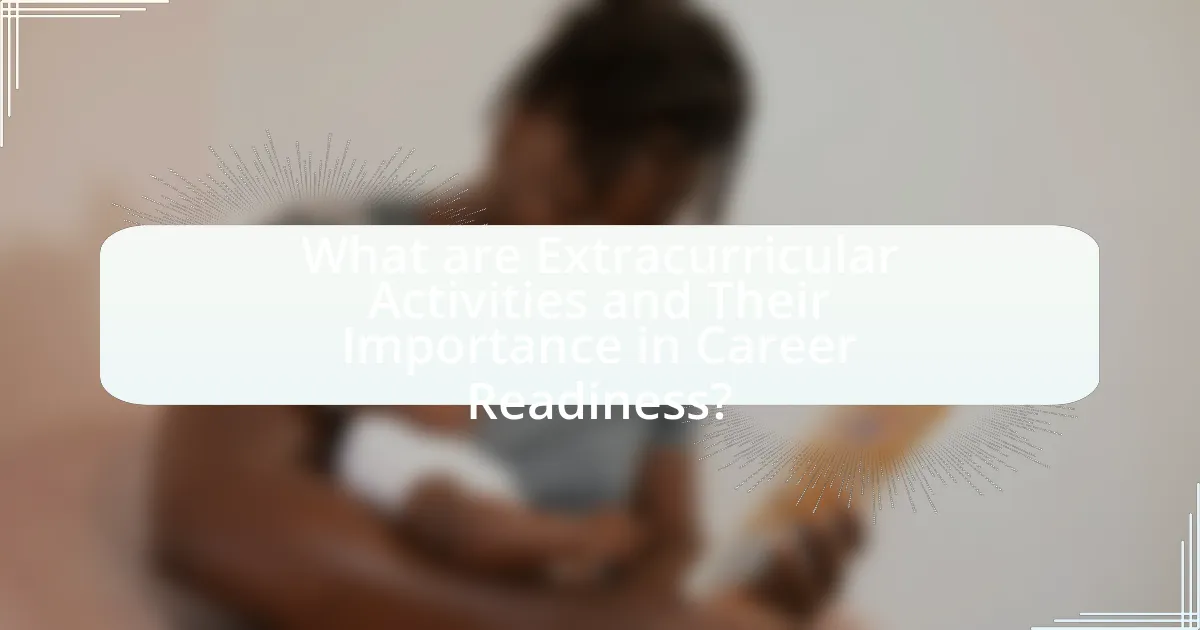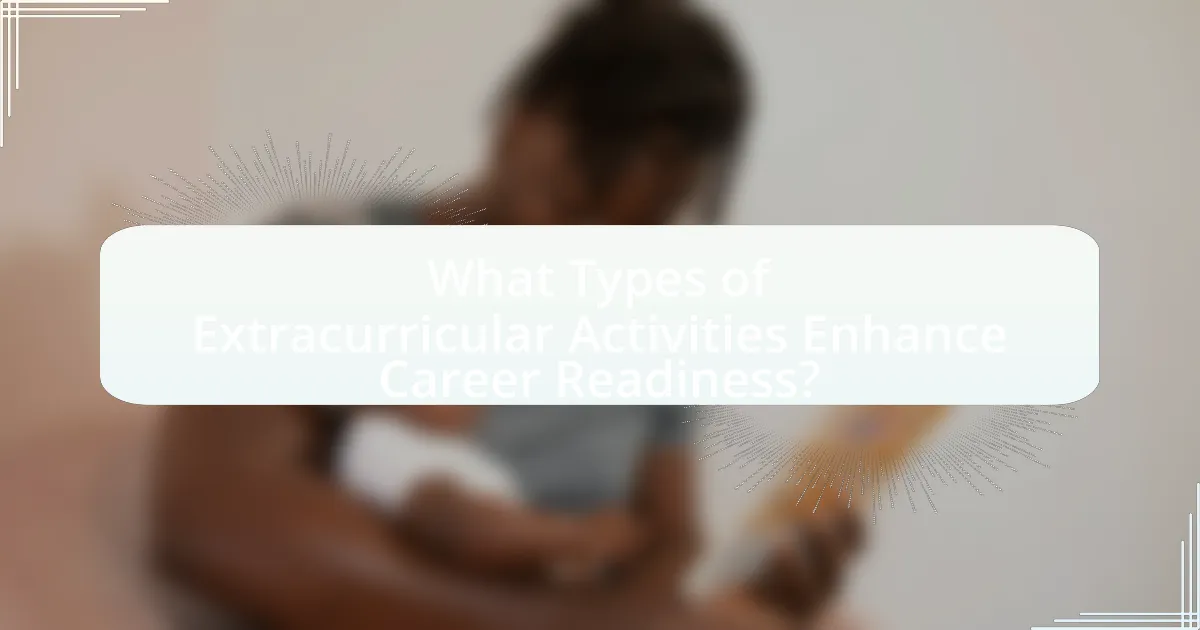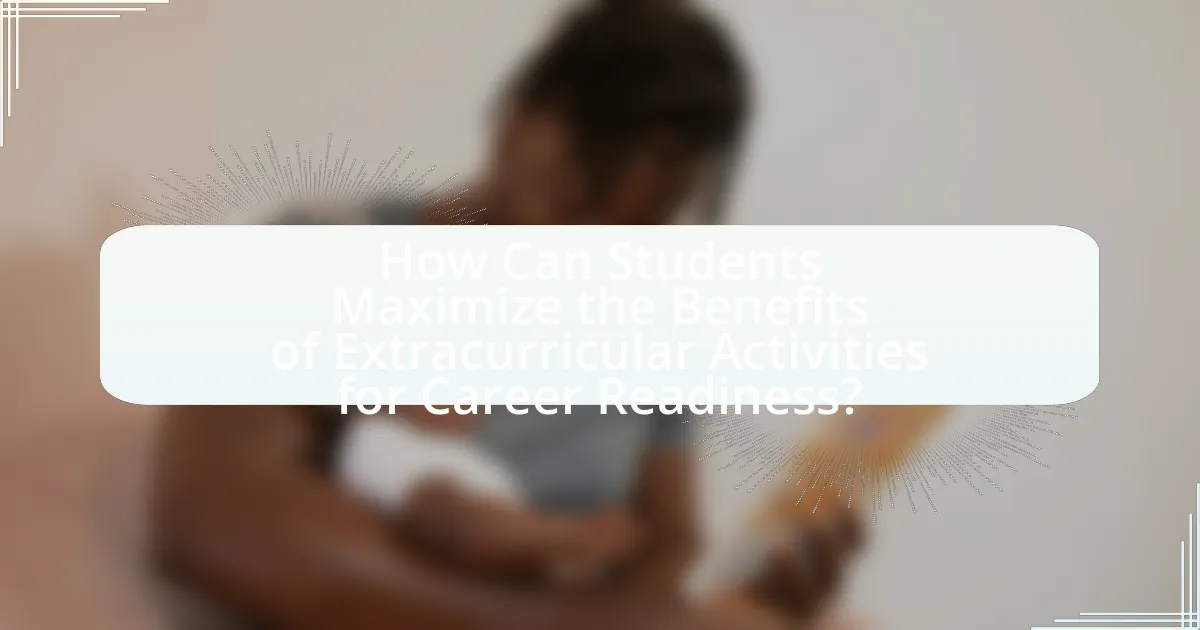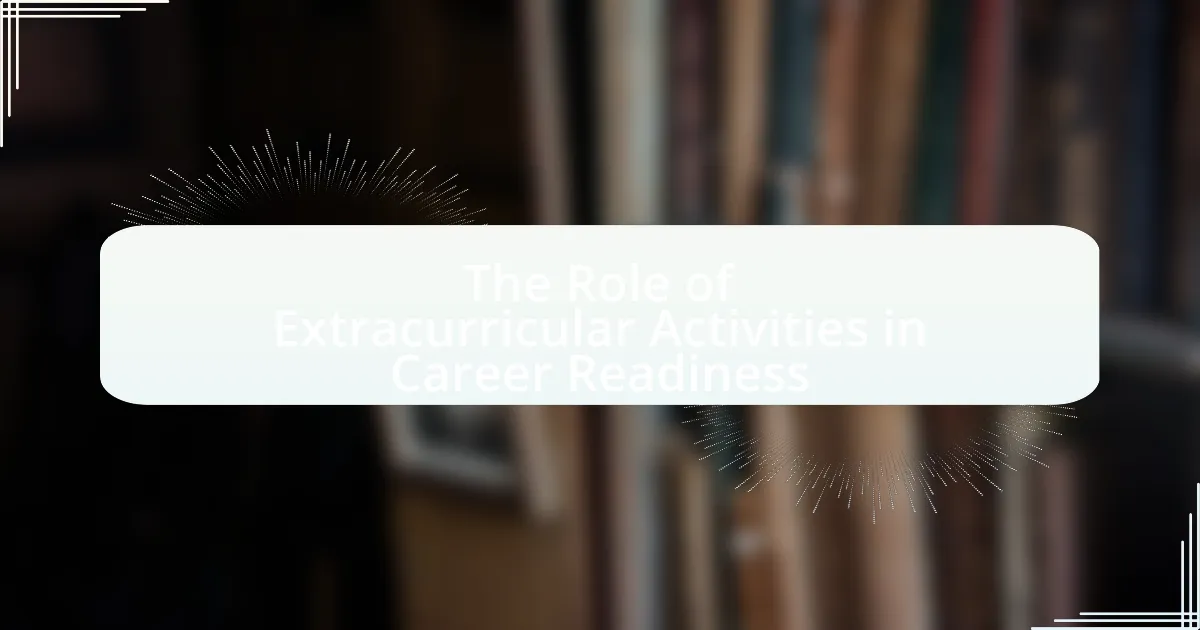Extracurricular activities encompass organized pursuits outside the academic curriculum, including sports, clubs, volunteer work, and arts, and play a vital role in career readiness. These activities foster essential skills such as teamwork, leadership, and time management, which are highly valued by employers. Research indicates that students involved in extracurriculars are more likely to achieve higher academic performance and pursue further education, enhancing their employability. The article explores how specific extracurricular activities contribute to skill development, their impact on workplace readiness, and strategies for students to maximize their benefits for future career success.

What are Extracurricular Activities and Their Importance in Career Readiness?
Extracurricular activities are organized pursuits outside of the standard academic curriculum, including sports, clubs, volunteer work, and arts. These activities are crucial for career readiness as they help develop essential skills such as teamwork, leadership, and time management. Research indicates that students involved in extracurricular activities are more likely to demonstrate higher levels of engagement and improved academic performance, which are key indicators of future career success. For instance, a study by the National Center for Education Statistics found that students participating in extracurricular activities are 20% more likely to pursue higher education, enhancing their employability.
How do extracurricular activities contribute to skill development?
Extracurricular activities contribute to skill development by providing practical experiences that enhance various competencies. Participation in these activities fosters teamwork, leadership, communication, and problem-solving skills, which are essential in professional environments. For instance, a study by the National Center for Education Statistics found that students involved in extracurricular activities are more likely to develop strong interpersonal skills and exhibit higher levels of engagement in their academic and future career pursuits. Additionally, involvement in clubs or sports often requires individuals to set goals, manage time effectively, and adapt to challenges, further reinforcing their ability to navigate real-world situations.
What specific skills can be gained from participation in extracurricular activities?
Participation in extracurricular activities can lead to the development of specific skills such as leadership, teamwork, time management, and communication. Leadership skills are cultivated through roles that require guiding peers, while teamwork skills are enhanced by collaborating on group projects or sports. Time management is improved as students balance academic responsibilities with extracurricular commitments, and communication skills are refined through presentations, discussions, and networking opportunities. Research by the National Center for Education Statistics indicates that students involved in extracurricular activities are more likely to demonstrate these skills, which are essential for career readiness.
How do these skills translate to the workplace?
Extracurricular activities develop essential skills that directly translate to the workplace, such as teamwork, leadership, and time management. For instance, participation in team sports fosters collaboration and communication skills, which are critical in most professional environments. A study by the National Association of Colleges and Employers found that 73% of employers value teamwork skills, highlighting the importance of these competencies in job performance. Additionally, leadership roles in clubs or organizations enhance decision-making abilities and responsibility, traits that are highly sought after in managerial positions. Time management skills gained from balancing academics and extracurricular commitments prepare individuals to meet deadlines and prioritize tasks effectively in a professional setting.
Why are extracurricular activities considered essential for career readiness?
Extracurricular activities are considered essential for career readiness because they develop critical skills and competencies that employers value. Participation in these activities fosters teamwork, leadership, and time management, which are crucial in professional environments. For instance, a study by the National Association of Colleges and Employers found that 73% of employers seek candidates with strong interpersonal skills, often honed through group projects and clubs. Additionally, extracurricular involvement provides networking opportunities and real-world experiences that enhance resumes, making candidates more competitive in the job market.
What role do extracurricular activities play in enhancing employability?
Extracurricular activities significantly enhance employability by developing essential skills and competencies that employers value. Participation in these activities fosters teamwork, leadership, and communication skills, which are critical in the workplace. For instance, a study by the National Association of Colleges and Employers (NACE) found that 73% of employers seek candidates with strong interpersonal skills, often cultivated through group activities and clubs. Additionally, involvement in extracurriculars demonstrates initiative and time management, as students balance academics with other commitments, making them more attractive to potential employers.
How do employers perceive extracurricular involvement during hiring processes?
Employers generally perceive extracurricular involvement as a positive indicator of a candidate’s skills and attributes during hiring processes. This perception stems from the belief that participation in extracurricular activities demonstrates qualities such as leadership, teamwork, time management, and commitment. Research conducted by the National Association of Colleges and Employers (NACE) indicates that 73% of employers value extracurricular activities as a significant factor in assessing a candidate’s readiness for the workforce. This statistic highlights the importance employers place on the skills developed through such involvement, reinforcing the idea that candidates with diverse extracurricular experiences are often viewed more favorably.

What Types of Extracurricular Activities Enhance Career Readiness?
Extracurricular activities that enhance career readiness include leadership roles in student organizations, internships, volunteer work, and participation in professional associations. Leadership roles, such as being a club president or team captain, develop essential skills like teamwork, communication, and problem-solving. Internships provide practical experience and industry exposure, which are critical for understanding workplace dynamics and building professional networks. Volunteer work fosters a sense of community and enhances soft skills, while involvement in professional associations offers networking opportunities and insights into specific career fields. Research indicates that students engaged in these activities are more likely to secure employment and perform better in their careers, as evidenced by a study from the National Association of Colleges and Employers, which found that 70% of employers value extracurricular involvement when hiring.
Which extracurricular activities are most beneficial for specific career paths?
Extracurricular activities that are most beneficial for specific career paths include debate clubs for law, coding clubs for technology, and volunteer work for healthcare. Debate clubs enhance critical thinking and public speaking skills, essential for legal careers, as evidenced by studies showing that law students with debate experience perform better in oral advocacy. Coding clubs provide hands-on programming experience, which is crucial for technology careers, supported by the fact that 70% of tech employers prioritize practical coding skills in candidates. Volunteer work in healthcare settings fosters empathy and communication skills, vital for medical professions, with research indicating that medical students engaged in volunteer activities report higher levels of patient interaction skills.
How do leadership roles in clubs impact career readiness?
Leadership roles in clubs significantly enhance career readiness by developing essential skills such as teamwork, communication, and problem-solving. Individuals in these positions often manage projects, coordinate events, and lead teams, which fosters practical experience in organizational and leadership skills. Research indicates that students who engage in leadership roles are more likely to demonstrate higher levels of employability, as they acquire competencies that employers value, such as initiative and responsibility. For instance, a study by the National Association of Colleges and Employers found that 80% of employers seek candidates with strong leadership skills, highlighting the direct correlation between club leadership and career preparedness.
What is the significance of volunteer work in developing professional skills?
Volunteer work is significant in developing professional skills as it provides practical experience, enhances soft skills, and expands professional networks. Engaging in volunteer activities allows individuals to apply theoretical knowledge in real-world situations, fostering skills such as teamwork, communication, and problem-solving. According to a study by the Corporation for National and Community Service, 63% of employers prefer candidates with volunteer experience, highlighting the value of such work in enhancing employability. Additionally, volunteering often involves leadership roles and project management, which are critical competencies in the workplace.
How do academic-related extracurriculars differ from non-academic ones in terms of career readiness?
Academic-related extracurriculars enhance career readiness by providing specific skills and knowledge relevant to professional fields, while non-academic extracurriculars often focus on general life skills and personal development. For instance, participation in academic clubs, such as debate or science fairs, fosters critical thinking, research abilities, and communication skills directly applicable to many careers. In contrast, non-academic activities like sports or arts may develop teamwork and creativity but may not directly correlate with specific job skills. Research indicates that students involved in academic extracurriculars report higher levels of preparedness for their future careers, as these activities often include mentorship opportunities and networking within their fields of interest.
What advantages do academic clubs provide for students’ future careers?
Academic clubs provide significant advantages for students’ future careers by enhancing skills, networking opportunities, and practical experience. Participation in these clubs fosters critical thinking, teamwork, and leadership abilities, which are essential in the workplace. For instance, a study by the National Association of Colleges and Employers found that employers prioritize candidates with strong communication and problem-solving skills, both of which are developed through active involvement in academic clubs. Additionally, these clubs often facilitate connections with industry professionals and alumni, creating valuable networking opportunities that can lead to internships and job placements.
How can sports participation influence teamwork and leadership skills?
Sports participation significantly enhances teamwork and leadership skills by fostering collaboration and communication among team members. Engaging in sports requires individuals to work together towards a common goal, which cultivates a sense of unity and shared responsibility. Research indicates that athletes often develop critical interpersonal skills, such as conflict resolution and effective communication, which are essential for successful teamwork. For instance, a study published in the Journal of Applied Sport Psychology found that team sports participants reported higher levels of cooperation and leadership abilities compared to non-participants. This evidence underscores the role of sports in shaping individuals who can lead and collaborate effectively in various professional settings.

How Can Students Maximize the Benefits of Extracurricular Activities for Career Readiness?
Students can maximize the benefits of extracurricular activities for career readiness by actively engaging in leadership roles, networking with peers and professionals, and aligning their activities with career goals. Engaging in leadership roles, such as being a club president or team captain, develops essential skills like communication and teamwork, which are highly valued by employers. Networking during these activities allows students to build connections that can lead to internships or job opportunities, as studies show that 70% of jobs are found through networking. Additionally, selecting extracurriculars that align with career aspirations, such as joining a debate club for aspiring lawyers or a coding club for future software developers, provides relevant experience and enhances resumes.
What strategies can students employ to choose the right extracurricular activities?
Students can employ several strategies to choose the right extracurricular activities by aligning their interests and career goals with available options. First, students should assess their personal interests and strengths, as engaging in activities they are passionate about increases motivation and commitment. Research indicates that students involved in activities that resonate with their interests are more likely to develop relevant skills and networks, which are crucial for career readiness.
Next, students should consider the skills they wish to develop, such as leadership, teamwork, or communication. For instance, participating in debate clubs can enhance public speaking skills, while volunteering can foster teamwork and empathy. According to a study published in the Journal of Educational Psychology, students who engage in skill-building extracurriculars report higher levels of self-efficacy and preparedness for future careers.
Additionally, students should seek advice from mentors, teachers, or career counselors who can provide insights into which activities align with their career aspirations. Networking with peers who have similar goals can also help in identifying valuable extracurriculars. By strategically selecting activities that align with their interests, desired skills, and career guidance, students can effectively enhance their career readiness through extracurricular involvement.
How can students align their extracurricular choices with their career goals?
Students can align their extracurricular choices with their career goals by selecting activities that develop relevant skills and experiences. For instance, if a student aims for a career in marketing, participating in a student-run advertising club or internship can provide practical knowledge and networking opportunities. Research indicates that 70% of employers value extracurricular involvement as it demonstrates leadership and teamwork skills, which are crucial in the workplace. By strategically choosing activities that reflect their desired career paths, students can enhance their resumes and gain insights into their future professions.
What role does networking play in maximizing the benefits of extracurricular activities?
Networking significantly enhances the benefits of extracurricular activities by facilitating connections that can lead to career opportunities and mentorship. Engaging with peers, professionals, and alumni during these activities allows individuals to build relationships that provide access to job openings, internships, and valuable industry insights. Research indicates that approximately 70% of jobs are found through networking, underscoring its importance in leveraging extracurricular involvement for career advancement. By actively participating in networking opportunities, individuals can maximize the skills and experiences gained from extracurricular activities, ultimately improving their career readiness.
What are some best practices for balancing extracurricular activities with academic responsibilities?
To effectively balance extracurricular activities with academic responsibilities, students should prioritize time management and set clear goals. Implementing a structured schedule that allocates specific time blocks for studying, attending classes, and participating in extracurriculars can enhance productivity. Research indicates that students who utilize planners or digital calendars report higher academic performance and reduced stress levels. Additionally, students should assess their commitments regularly to ensure they are not overextending themselves, as studies show that excessive involvement can lead to burnout and negatively impact academic success. By maintaining open communication with teachers and activity leaders, students can negotiate deadlines and responsibilities, further supporting their ability to manage both areas effectively.
How can time management skills enhance the experience of participating in extracurriculars?
Time management skills enhance the experience of participating in extracurriculars by allowing individuals to allocate sufficient time for both their commitments and personal development. Effective time management enables students to balance academic responsibilities with extracurricular activities, leading to improved performance in both areas. Research indicates that students who practice time management report higher levels of satisfaction and achievement in their extracurricular involvement, as they can engage more fully without the stress of conflicting obligations. For instance, a study published in the Journal of Educational Psychology found that students who utilized time management strategies experienced a 20% increase in their overall engagement in extracurricular activities, demonstrating a clear link between these skills and enhanced participation experiences.
What tips can help students avoid burnout while engaging in multiple activities?
To avoid burnout while engaging in multiple activities, students should prioritize time management and self-care. Effective time management involves creating a structured schedule that allocates specific time blocks for studying, extracurricular activities, and relaxation. Research indicates that students who utilize planners or digital calendars report lower stress levels and improved academic performance. Additionally, incorporating regular breaks and physical activity into their routine can enhance mental well-being and prevent exhaustion. Studies show that physical exercise releases endorphins, which can improve mood and reduce feelings of burnout. Lastly, students should learn to say no to additional commitments when their schedules become overwhelming, as maintaining a manageable workload is crucial for sustaining long-term engagement in activities.
How can students effectively showcase their extracurricular experiences on resumes?
Students can effectively showcase their extracurricular experiences on resumes by clearly listing relevant activities, emphasizing skills gained, and quantifying achievements. By organizing experiences under a dedicated section titled “Extracurricular Activities,” students can highlight leadership roles, teamwork, and specific contributions. For instance, stating “Led a team of 10 in organizing a charity event that raised $5,000” demonstrates both leadership and impact. Additionally, using action verbs and focusing on transferable skills, such as communication and problem-solving, enhances the appeal of these experiences. Research indicates that employers value extracurricular involvement, as it reflects a candidate’s initiative and ability to balance multiple responsibilities, making it a crucial aspect of career readiness.
What format should be used to highlight extracurricular activities in a resume?
To highlight extracurricular activities in a resume, use a clear and organized format that includes the activity name, your role, the organization, and the dates of involvement. This structured approach allows employers to quickly assess your engagement and skills. For instance, list each activity under a dedicated section titled “Extracurricular Activities” or “Leadership Experience,” ensuring that the most relevant experiences are prioritized. This format is effective because it provides a concise overview of your involvement, demonstrating your commitment and skills, which are essential for career readiness.
How can students articulate the skills gained from extracurricular activities during interviews?
Students can articulate the skills gained from extracurricular activities during interviews by clearly linking specific experiences to relevant competencies. For instance, a student who led a club can highlight leadership and teamwork skills, explaining how they organized events and collaborated with peers to achieve common goals. This approach not only demonstrates the application of skills but also provides concrete examples that interviewers can easily understand. Research indicates that 70% of employers value soft skills, such as communication and problem-solving, which are often developed through extracurricular involvement, reinforcing the importance of effectively communicating these experiences during interviews.

Leave a Reply